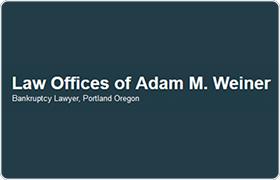Beavercreek Collection Lawyer, Oregon
Sponsored Law Firm
-
 x
x

Click For More Info:
-
Law Offices of Adam M. Weiner
8624 SE 13th Ave Portland, OR 97202» view mapBankruptcy & Debt Premier Bankruptcy Attorney
Life doesn’t always have to be hard. Consult with a bankruptcy attorney who looks out for your best interests. Call today to begin the process for a fresh financial start.
503-719-5123
Adam M. Weiner
✓ VERIFIEDBankruptcy & Debt, Credit & Debt, Collection
Adam Weiner has been practicing law in Oregon since May 1998. After successfully spending many years representing individuals in different types of... (more)
David Smith
Corporate, Business Organization, Banking & Finance, Collection
Status: In Good Standing Licensed: 28 Years
Timothy James Zimmerman
Commercial Real Estate, Civil Rights, Credit & Debt, Collection
Status: In Good Standing Licensed: 37 Years
Timothy J Zimmerman
Commercial Real Estate, Civil Rights, Credit & Debt, Collection
Status: In Good Standing Licensed: 37 Years
Brian D. Chenoweth
Eminent Domain, Franchising, Collection, Products Liability
Status: In Good Standing Licensed: 30 Years
Dennis M Paterson
Litigation, Collection, Commercial Real Estate, Bankruptcy
Status: Inactive Licensed: 42 Years
Miles D Monson
Other, Credit & Debt, Collection, Bankruptcy
Status: In Good Standing Licensed: 32 Years
 Adam M. Weiner Portland, OR
Adam M. Weiner Portland, OR Practice AreasExpertise
Practice AreasExpertise

